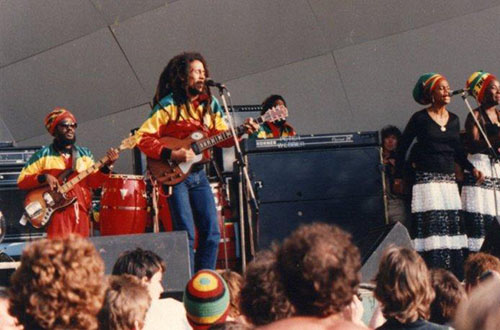Bob Marley and the Wailers have a history, together and separately; here is the backstory.
Robert Nesta Marley, recipient of the Jamaican Order of Merit (1945–1981) was a Jamaican singer-songwriter, musician and guitarist who achieved international fame and acclaim, blending mostly reggae, ska and rocksteady in his compositions. Starting out in 1963 with the group the Wailers, he forged a distinctive songwriting and vocal style that would later resonate with audiences worldwide. The Wailers would go on to release some of the earliest reggae records with producer Lee “Scratch” Perry.
There are important distinctions that existed at the times these entities performed and recorded. The Wailers, formed in Kingston, Jamaica, in 1963, was a vocal group consisting of Junior Braithwaite, Beverley Kelso, Bunny Livingston, Bob Marley, Peter McIntosh (Tosh), and Cherry Smith; they were called variously the Teenagers, the Wailing Rudeboys, the Wailing Wailers, and finally the Wailers.
Braithwaite, Kelso, and Smith had departed by 1966, leaving the trio of Livingston, Marley, and McIntosh. By the early ’70s, they had begun playing musical instruments and added a rhythm section consisting of brothers Aston “Family Man” Barrett (bass) and Carlton (Carlie) Barrett (drums). After recording extensively in Jamaica, this unit was signed to Great Britain’s Island Records, which issued its label debut, Catch a Fire, in April 1973, followed by Burnin’ in November. These albums attracted critical attention but did not chart at first.
By the time of Natty Dread (1974), the original group had split, with McIntosh (later billed as Peter Tosh) and Livingston (later billed as Bunny Wailer) leaving. The album was credited to Bob Marley & the Wailers, the group consisting of Marley, the Barretts, keyboard player Bernard “Touter” Harvey, and lead guitarist Al Anderson, with backing vocals by the I-Threes (Marcia Griffiths, Rita Marley, and Judy Mowatt). The breakthrough for this group was their appearance at the Lyceum in London on July 18, 1975. The show was recorded and quickly released on LP as Live!, and Marley and his reggae music became an international sensation.
After the Wailers disbanded in 1974, Marley pursued a solo career upon his relocation to England that culminated in the release of the album Exodus in 1977, which established his worldwide reputation and elevated his status as one of the world’s best-selling artists of all time, with sales of more than 75 million records. Exodus stayed on the British album charts for 56 consecutive weeks. It included four UK hit singles: “Exodus”, “Waiting in Vain”, “Jamming”, and “One Love.”
In 1978, Marley released the album Kaya, which included the hit singles “Is This Love” and “Satisfy My Soul.” The greatest hits album, Legend, was released in 1984, three years after Marley died of acral lentiginous melanoma in 1981. It subsequently became the best-selling reggae album of all time, topping the British charts with “One Love/People Get Ready,” (originally released on Exodus) becoming a Top Five single, “Waiting in Vain” returning to the Top 40, and “Could You Be Loved” returning to the charts. American chart statistics were not as spectacular, but the album became a perennial seller; before the end of the century, it had been certified for sales of ten million copies.
A committed Rastafari who infused his music with a sense of spirituality, Bob Marley is credited with popularizing reggae music around the world and served as a symbol of Jamaican culture and identity.
Allmusic dot com sums it up: “Thus, in practice, recordings by Bob Marley & the Wailers can refer to any music featuring Marley and made in the ’60s, ’70s, and ’80s, though careful listeners will insist that the credit should apply only to the recordings and performances of Marley and his regular backup group from the breakup of the original Wailers trio in 1974 to Marley’s death in 1981.”
Artist Web Site
Discography
The Wailing Wailers (1965)
Soul Rebels (1970)
Soul Revolution (1971)
The Best of The Wailers (1971)
Catch a Fire (1973)
Burnin’ (1973)
Natty Dread (1974)
Rastaman Vibration (1976)
Exodus (1977) (50th anniversary!)
Kaya (1978)
Survival (1979)
Uprising (1980)
Confrontation (1983)
Videos
